Real life stories of how the NDIS is helping Australians with disability re-define their lives



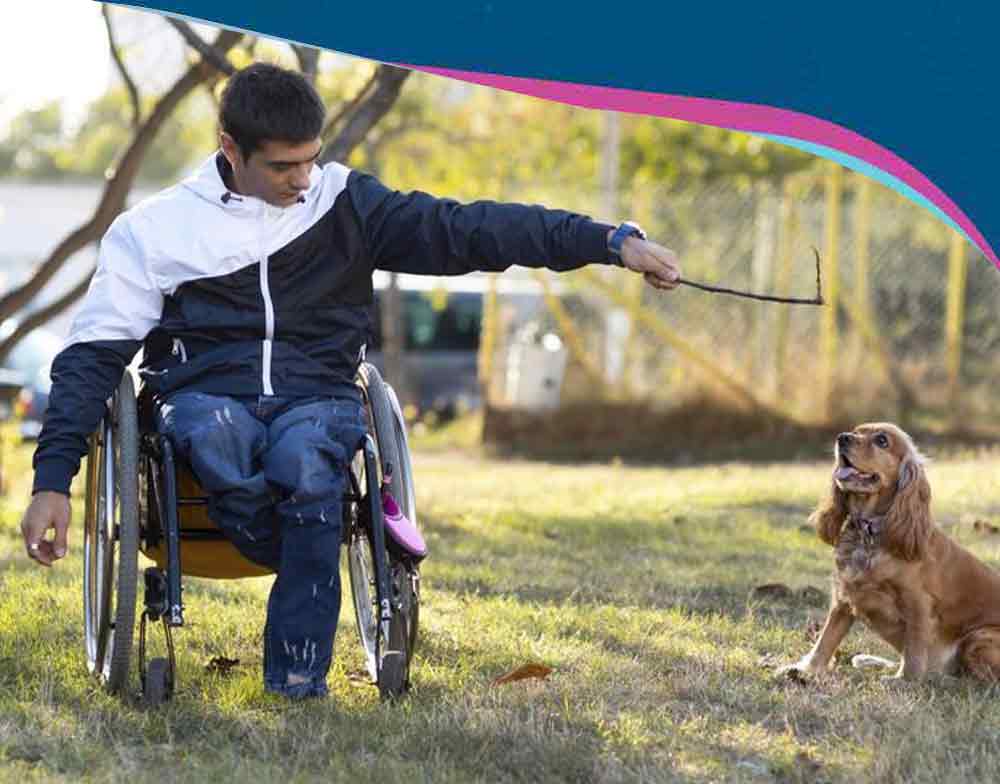
At SeenCare, we focus on supporting NDIS participants with complex care requirements and high medical needs.
Our unique model of doctor and nurse-led integrated care bridges the gap between disability and healthcare, providing new opportunities in community living options for people with disability
However, as nice as all that sounds, it doesn’t really explain what we do (not the most important parts anyway).
For that, we need to look at the real-world human outcomes achieved through NDIS supports.
Below is an overview of the journey we’ve been honoured to share with one of our participants named Will.


In February 2023, a severe stroke left Will—a 41 year old father of two daughters, loving husband, and successful business owner—unable to speak, walk or communicate.
After 6 months in hospital, Will still required a tracheostomy (to help him breathe), a PEG tube (for feeding) and a supra-pubic catheter (SPC; for managing his bladder). His speech remained unclear, communication was challenging and Will required full assistance to complete most of his daily activities.
This left Will and his family with a very difficult decision to make.
After receiving comprehensive treatment and specialist rehabilitation from Austin Health, Will had recovered as much as possible in a hospital environment. However, he still wasn’t at the stage where he could return to live at home with his wife and daughters.
Tragically, the family was confronted with the possibility of Will—co-owner of a thriving real-estate firm, active and involved father, and dedicated husband—entering a nursing home type facility at only 41 years of age.
Fortunately, the team at Austin had submitted an NDIS application early on during Will’s admission. So once his medical condition stabilised, this provided some options for further recovery in a community setting.
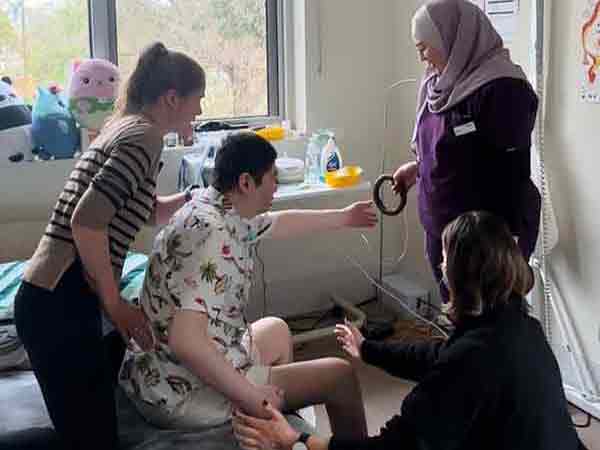
But, before we get into that, let’s look at Will’s life story further. Because as much as we believe the NDIS is an important part of his story, Will’s strength of character, personal determination and strong bond with his family are the true driving force behind what is turning out to be an inspiring story of recovery against the toughest of odds.
Life before the stroke
Will’s story began in China, where he was born and raised.
At the age of 15, he moved to Malaysia to pursue his education. He became highly independent during his teenage years, gaining valuable experience in different cultures. After completing a Bachelor of Graphic Design and a Master of Multimedia Design, Will moved to Australia to build a new life.
After exploring several different work areas, Will found success in the real estate industry. He co-founded a real estate firm in Melbourne, which thanks to his hard work and perseverance, grew to the point that it provided financial security for both Will’s and his wife’s immediate and extended family.
But, despite his considerable business accomplishments, Will’s proudest achievement is his close bond with his two daughters—Olivia and Audrey.



His wife Queenie, showed a tremendous amount of support and dedication from day one. She remained by his bedside for the best part of 18 months while he was in hospital, alongside being a devoted mother to their two daughters, maintaining their routine with school and extracurricular activities.
Queenie’s desire to help Will recover was so deep that she took the time to learn a considerable amount of medical knowledge about his condition. This allowed Queenie to provide invaluable practical support to supplement his care while in hospital. She also acted as a strong advocate to ensure all decisions were made with Will’s goals and best interests at heart.
To further his recovery, Queenie facilitated Will’s parents travelling from China. This, coupled with regular visits from his daughters, ensured that Will always felt loved and connected. His room is always brightly decorated with colourful paintings and drawings from his daughters, who tell their friends about how brave and strong their dad is.
Queenie’s experience sparked a desire to expand her medical knowledge even further. She plans to study nursing, with a goal of one day using her lived experience to support others going through similar situations as her family.

Despite the progress he made in hospital, the medical team and Will’s family understood that the time would come when he would need to move on to another living environment.
Not only does remaining in hospital long-term carry some risks. But Will’s recovery had also started to plateau (most likely due to the unavoidably repetitive and somewhat restrictive environment of an inpatient hospital ward).
Everyone agreed that a home-like setting would be a beneficial change. However, due to his high care needs and fragile medical status, it was not viable (yet) for Will to move back to the family home.
By this stage, SeenCare had already been working with Will and his family for several weeks, via our Complex Hospital Discharge Program. Our doctors, nurses and specialist support workers met with everyone involved and discussed goals and options.
The consensus was to explore a placement with a Specialist Disability Accommodation (SDA) provider. This would enable Will to live in a home-style environment with the necessary modifications for his physical limitations. It would also let him live near to his family, so they could continue to support his recovery.

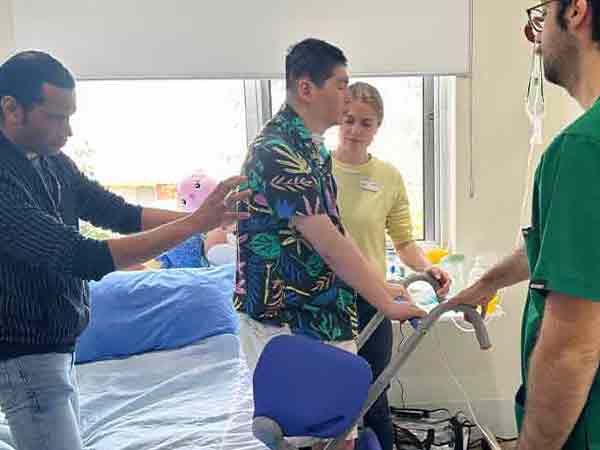

Once a suitable SDA house was found, attention turned to making practical arrangements for Will’s discharge from hospital.
The initial plan was for SeenCare to provide daily medical and disability support, with Austin Health visiting for specialist rehabilitation therapy where required.
Dr. Majoka is coordinating Will’s medical care, with regular input from team leaders Amir and nurse Alisha. Will also has a consistent group of specialist support workers from SeenCare, with Jean-Paul, Sandesh and Tracey being his primary direct carers.
Due to his complex needs, Will has an extensive care plan. Tasks the team at SeenCare attend to include:

Will made remarkable improvement within just one month of being discharged from hospital to SDA.
Key rehab areas Will has progressed in include:
Speech & communication – This has been one of the most inspiring aspects of Will’s recovery. He struggled to speak clearly upon discharge. However, with much persistence and practice, he can now talk more clearly (in both Mandarin and English), engage in conversations and communicate more effectively with his family and staff.
Swallowing – With ongoing help from the Speech Therapy team at Austin, Will has regained some of his swallowing abilities. He can now semi-independently eat pureed food by mouth. This has bought back the joy of eating and provided another independent living skill he can focus on developing.
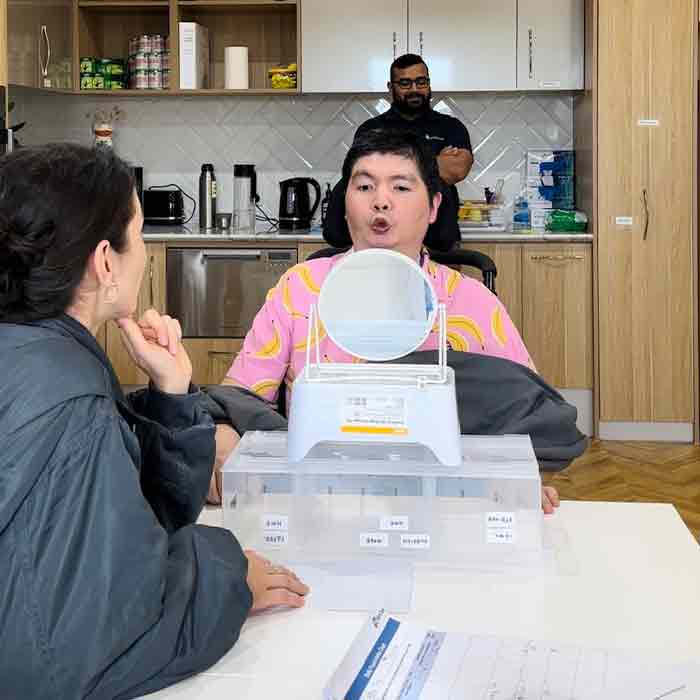
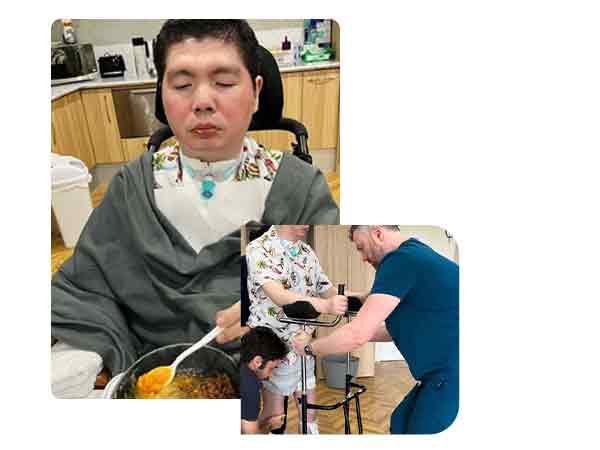

Strength & mobility – Will has made great strides in physical therapy. Several staff members have commented on his determination to push himself to do more each session. He is slowly but steadily regaining his physical strength and mobility.
This progress in functional ability and independence seems to be carrying over to Will’s emotional wellbeing, with staff noting he is steadily becoming more communicative and social. Queenie also commented that Will seems to take particular pride in being able to express himself more and demonstrate continued improvement.

The plan for the short term is to continue the current care and therapy arrangements while Will keeps achieving such rapid progress with his rehabilitation.
His wife Queenie and the rest of the family would obviously love to have him back living at home as soon as possible. However, everyone is very understanding of the benefits of staying in a supported environment like SDA to maximise Will’s initial rehab gains.
Will has been able to undertake regular visits home since leaving hospital. We expect that in time, these can become more frequent and for longer durations, with an ultimate plan to move back home full-time with ongoing support from SeenCare.